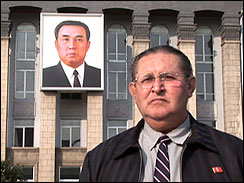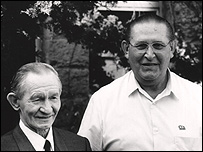Korea Herald
Lee Joo-Hee
1/30/2007
Officials from Washington and Pyongyang are in Beijing today for their second round of talks on U.S. financial sanctions against North Korea.
The discussions are likely to set the tone for the upcoming round of six-party talks scheduled to resume early next month.
The agenda is thought to include North Korea’s acknowledgement of illicit financial activity, a pledge to prevent any reoccurrence, and the lifting of a U.S. embargo on North Korean accounts at a Macau bank.
Washington imposed financial restrictions against Banco Delta Asia after charging the bank with helping North Korea launder counterfeit dollars and funds raised from smuggling restricted goods. The move prompted Pyongyang to boycott the six-party talks process in 2005.
Upon returning to the six-party process in December last year, North Korea demanded it must first solve the financial issue before discussing the nuclear question.
The United States remains adamant that the financial measures were separate from the nuclear issue but has offered to discuss it on the sidelines of the nuclear talks.
The U.S. side is led by Daniel Glaser, the Treasury Department’s deputy assistant secretary for terrorist financing and financial crimes.
The North Korean team is led by Oh Gwang-chul, president of the Foreign Trade Bank of Korea, the reclusive regime’s window for foreign banking.
The two delegations are likely to discuss the technical aspects of the issue, which North Korea claims was a political gesture by the United States as part of its hostile policy.
On Sept. 15, 2005 the U.S. Treasury Department banned all American banks from dealing with Banco Delta Asia for allegedly helping North Korean companies launder money from smuggled cigarettes and counterfeit $100 bills.
Washington and Pyongyang have been exchanging questions and information regarding the measures since their first discussion in Beijing on the sidelines of the six-party talks last month.
N. Korean financial officials arrive in Beijing for talks on U.S. sanctions
Yonhap
1/30/2007
A group of North Korean financial experts arrived in Beijing Tuesday for talks with their U.S. counterparts on removing U.S. financial sanctions on the North, a major hurdle to six-way negotiations on the communist nation’s nuclear weapons program.
The U.S.-North Korea financial talks come ahead of a new round of six-nation negotiations next week aimed at persuading North Korea to give up its nuclear weapons program.
The Chinese Foreign Ministry said Tuesday the new round of the nuclear disarmament talks will start Feb. 8.
The North Koreans, headed by O Kwang-chol, president of the North’s Foreign Trade Bank, arrived in the Chinese capital at 9:30 a.m. The North Koreans were expected to hold talks with a U.S. financial team led by Daniel Glaser, a deputy assistant secretary at the U.S. Treasury Department.
Upon arriving from Pyongyang, the head North Korean delegate said the sides would hold talks at their countries’ embassies here.
The two last met here on the sidelines of a December round of the nuclear talks, also held in Beijing. The working-group financial meeting seeks to remove U.S. sanctions imposed in September 2005 on a Macau bank suspected of laundering money for the North, which Pyongyang used as an excuse to stay away from the nuclear talks for 13 months.
Expectations of progress from the financial discussions, as well as the nuclear talks, have been significantly raised following a three-day meeting of top U.S. and North Korean nuclear negotiators in Berlin earlier in the month, at which the two agreed “on a number of issues,” according to Christopher Hill, the top U.S. nuclear envoy.
Hill said Monday (Washington time) that the next round of the nuclear talks could produce an agreement similar to a 1994 pact in which North Korea agreed to freeze its nuclear activities in return for economic and energy assistance. The 1994 Agreed Framework became defunct when the ongoing dispute over the North’s nuclear ambitions erupted in late 2002.
However, Hill made it clear that the goal of the six-party negotiations is to carry out a 2005 agreement in which Pyongyang agreed in principle to completely and verifiably dismantle its nuclear program in return for economic and diplomatic benefits.
“Whatever emerges in the next round, our job will not be finished until the full joint statement is finally realized and implemented,” Hill told Reuters in Washington.
“I am not too worried whether something might look like the Agreed Framework because we’re only looking at part of what we’re aiming at,” Hill added.
The top U.S. envoy to the financial talks Tuesday also expressed hope for progress.
“We are prepared to go through these talks as long as it takes for us to get through our agenda,” Glaser was quoted as telling reporters in Beijing. “I am hopeful we’ll make progress.”
Treasury officials have so far refused to confirm it, but recent reports said the United States may unfreeze part of North Korea’s assets at the Macau bank to help move the nuclear negotiations forward.
Pyongyang has about US$24 million in 50 accounts at the Macau bank, Banco Delta Asia, and as much as $13 million is believed to belong to legitimate accounts.

 The folks who brought us “
The folks who brought us “ In the 1960s four US soldiers separately defected to North Korea, and were little heard from again.
In the 1960s four US soldiers separately defected to North Korea, and were little heard from again.